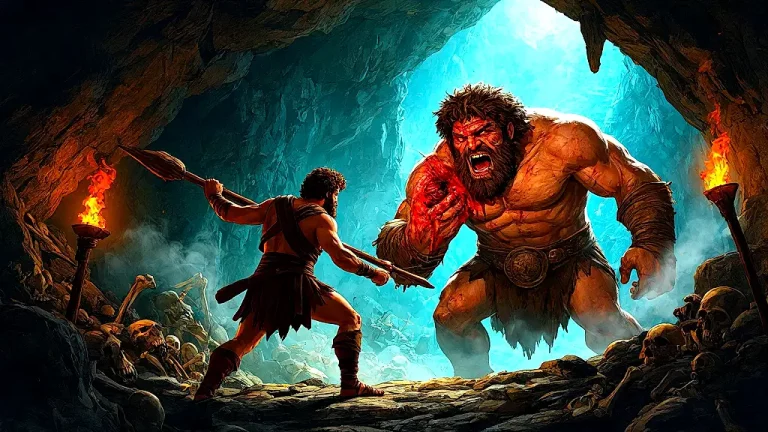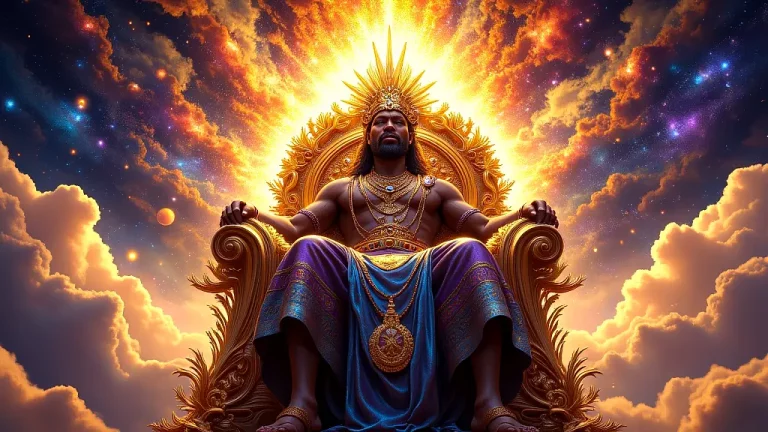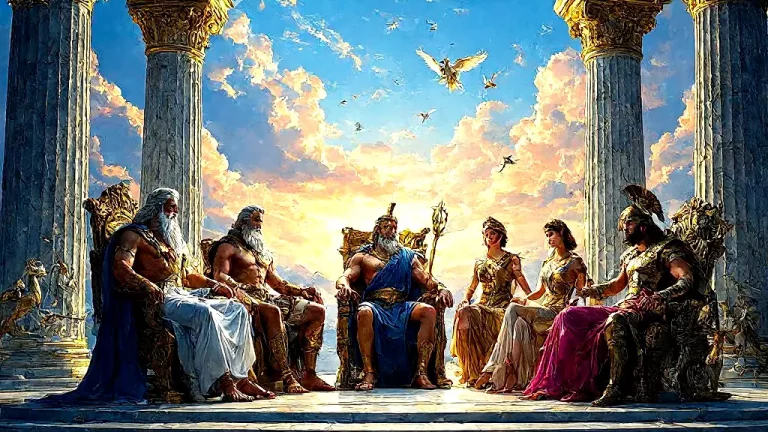Arete: Greek Goddess Of Virtue And Excellence In Mythology
In the rich tapestry of Greek stories, Arete is a representation of being good and being excellent, showing ideals that were valued highly in ancient Greek life. Picture Arete as holding the highest standards someone might aim for, like a mentor or an example of being good today.
Key Points:
- Arete stands for virtue and excellence in Greek mythology.
- She is a guide for gods and heroes, like Heracles and Odysseus.
- Arete’s values include courage, honor, and doing right.
- She is linked to gods like Athena and Apollo.
- Arete appears in Greek art as a noble figure.
- Her virtues influenced both heroes and regular Greeks.
- Arete is part of a larger world of Greek spirits.
Her presence in stories means a guiding light, you see, the qualities of being good and having strong moral integrity that the Greeks admired. As you look into the stories and examples of Arete, you will see how she affected not just the gods and heroes in myths but also the everyday lives of those in ancient Greece.
This look will make clear Arete’s virtues and their deep impact, giving insights into how these ideas that last through time shaped both legendary characters and ordinary people alike.
Arete: Overview and Key Facts
| Key Aspect | Description |
|---|---|
| Name | Arete |
| Meaning | The name “Arete” means “virtue” or “excellence” in ancient Greek language, holding the ideas she stands for. |
| Role in Mythology | Arete is an example of being good and doing well, standing for the ethical and moral ideas important to Greek life. |
| Parentage | Although stories about her start are different, Arete is often linked with the family line of gods, showing divine traits. |
| Cultural Significance | Arete’s good traits were not only admired by the gods and those they make stories of but also acted as a moral guide for regular folks in ancient Greece. |
| Representation | In works of art and writings, Arete means a noble and encouraging person, seen often helping heroes on their paths for greatness. |
| Influence | Her impact goes beyond myths, affecting Greek thinking and the common values of ancient Greek life. |
Where Did Arete Come From in Greek Stories?
To get how big Arete’s effect is on Greek mythology, it’s key to look into where she started and the stories that first brought her into the Greek gods’ circle.
How Arete Got Her Start
In Greek myths, where Arete comes from is somewhat mysterious but is deeply tied to old Greek cultural values. Specific myths about her parents are not well-known, but Arete is often linked with a family line of gods, which means she stands for ideal values. Her name, “Arete,” comes from the word for “being good” or “excellent,” which shows her part as an example of these respected traits.
Arete can be seen as a model of moral goodness, like a leader’s example guiding in tough times. In stories, she is there to remind of the admired values by the Greeks: courage, honor, and strength in doing right.
Arete’s effect is found in key myths, with her often seen as someone who guides others towards great things. Some well-known myths mentioning Arete are:
- The story of Heracles, where Arete is a guiding figure for his path to redemption and being a hero.
- In Odysseus’s tale, where Arete’s values come through in his travels and the tests he faces.
- Perseus’s myth, where Arete’s effect is clear in his quest for noble deeds and right actions.
These tales emphasize that Arete’s values weren’t just ideas but were actively shown by heroes and admired figures in Greek myths, being a guide for both gods and regular people alike.

Arete, tied to Greek cultural values, represents moral excellence and guides heroes like Heracles, Odysseus, and Perseus towards courage, honor, and doing what’s right.
Arete’s Spot Among the Gods
Among the Greek gods’ complex order, Arete has a special place as an example of goodness and high quality, which both gods, and even regular people, highly valued. She may not have as much presence as some main Olympians, yet her effect is strong. Like a wise guide in times of moral confusion, that’s what Arete is.
Her connections with key gods show her role as a guide, acting as a measure of quality that even gods aimed for. For example, when dealing with gods like Athena, who is for wisdom, and Apollo, who is for prophecy, you can feel Arete’s presence, a quiet force that backs doing great things and right acts.

This scenario seems to mean how Arete’s values reach into the realm of gods, affecting not only their choices but their behaviors too.
What Arete Stands For
After looking at Arete’s origins and her important place with the gods, now a chance comes to really get into the core values and ideals she means in Greek mythology.
Arete as a Sign of Goodness and Excellence
In Greek myths, Arete acts as a perfect example of goodness and high quality, which were not only valued but also chased after by gods and regular people. For the Greeks, Arete came across as the best measure of right and proper behavior, like a guide for people aiming to be better.
Her part in stories means the effort to reach personal greatness and build one’s character, pushing folks to aim high in all areas of living. Arete’s role feels like that of a model, setting goals for others to match and want to achieve, creating a world full of honesty and respect.
Looking closely at how Arete’s traits are seen in stories, check out these examples:
- In Heracles’s story, Arete’s values are seen through his challenges and work, where he shows strength, bravery, and persistence.
- The Odyssey highlights Arete’s mark through Odysseus’s travels, showing his cleverness, toughness, and careful planning.
- Perseus’s tale means Arete’s aims through his courage and aim in doing good, like defeating Medusa to save his mother.
These tales mean just how Arete’s values were part of Greek myths, giving lasting lessons on the need to aim for personal greatness and being morally right.

Arete in Greek Art and Tales
In old Greek stories and art, Arete appears as someone who means excellence and doing the right thing, values highly thought of in Greek society. Artists and sculptors would make her look important, being excellent and right, much like how someone would see a statue of a modern leader or famous person today.
In literature, when you look at Arete’s traits, they are part of the tales and books that guide people, aiming for ideals. Homer’s works mean Arete as more than a character; she focuses on what heroes try to get, showing the cultural focus on being excellent and virtuous.
This way of seeing Arete in art and tales means her lasting power, explaining how her ideals were not only liked but made to last in what Greeks created.
Arete’s Effect on Heroes and Everyday People
After we look at how Arete appears in art and writings, it’s time to see how her good traits affected both famous heroes and the lives of regular people in old Greece.
Arete’s Help to Greek Heroes
In heroes’ stories, you clearly see Arete’s impact on journeys like those of Heracles and Odysseus. Heracles, famous for his amazing power and the Twelve Labors, is about the bravery and never-giving-up attitude that Arete’s virtues mean. Arete’s role is like that of a strong guide, pushing Heracles to go past his limits and do things many thought could not be done.
Likewise, Odysseus, the smart hero in Homer’s “Odyssey,” shows Arete’s ideas through his cleverness and toughness. On his long way home, Odysseus’s skill to handle troubles and outsmart foes mirrors the excellence and good traits that Arete inspires in those seeking her help. For a clearer view of Arete’s effect, let’s think about how her virtues appeared in what these heroes did.

Heracles’s tasks, from taking down the Nemean Lion to bringing in the Golden Hind, needed not just strength but also the strong willpower that Arete is. Each of his tasks proved his endless drive to be his best, like an athlete breaking records.
Odysseus’s travel, however, was about thinking smart and holding on, as dealing with mythical creatures and gods needed a thoughtful mind and strong heart, qualities Arete helped build.
To see Arete’s influence on different heroes, the following table puts her effect on their tasks side by side:
| Hero | Quest/Challenge | Arete’s Influence |
|---|---|---|
| Heracles | Twelve Labors | Bravery, never-giving-up, strong willpower |
| Odysseus | Journey in the “Odyssey” | Cleverness, toughness, careful thinking |
| Perseus | Slaying Medusa | Courage, doing what’s right |
This table means that Arete’s virtues were not only crucial to these heroes’ success but also served as a guide, much like a direction pointing them to their biggest goals.
Arete’s virtues like bravery, cleverness, and courage play a huge part in guiding heroes like Heracles, Odysseus, and Perseus to push their limits and reach their greatest achievements.
Arete’s Touch on Everyday Life
In ancient Greece, the values Arete had were not only kept in the world of heroes and gods. Instead, they spread through the lives of everyday folks. For many Greeks, the way they lived meant a lot like how we care about things like honesty and hard work today.
Whether a farmer working on crops, a craftsman making his tools right, or a thinker trying to know, the idea of Arete was their guide. This was like setting personal goals, helping people try to do their best all the time, and making a place where personal growth mattered. Moreover, Arete’s ideas deeply touched society and culture, changing both how people acted and how Greek society worked together.
You could see Arete’s virtues in schools back then, where young Greeks learned to care about good things with both mind and body, just like how schools now focus on all-around learning. Public life was shaped by these ideas, too, because people were urged to join community jobs and help the common good.
This focus on Arete helped develop a place that valued respect, duty, and always trying to be better, leaving a mark that changed Western ideas for a very long time.

Arete in the Bigger World of Greek Spirits and Daimones
Among Greek spirits and daimones, who stand for many parts of life and what it means to be human, Arete has a special place in the wide world of Greek tales. Unlike the others who often mean very specific or more worrying things, Arete shows broad ideas of being good and doing well, what people should aim for in their actions and thoughts.
Because she is with these spirits, it means ancient Greeks respected getting better both as people and together as a group, marking her as a strong good influence inside the mythological hierarchy. For anyone curious about more context on these mythological beings, the list of Greek spirits and daimones offers some knowledge on the different parts they play and what makes them interesting.
FAQs
1. Who were Arete’s parents in Greek mythology?
Arete’s parents in Greek mythology are often identified as the goddesses Praxidike and Soter.
2. How did Arete influence Greek heroes?
Arete influenced Greek heroes by embodying the ideals of virtue and excellence, inspiring them to pursue greatness and moral integrity in their quests.
3. What are some famous myths involving Arete?
Some famous myths involving Arete include her guidance of Heracles and Odysseus in their quests for virtue and excellence.
4. How is Arete depicted in ancient Greek art?
Arete is depicted in ancient Greek art as a personification of virtue and excellence, often portrayed as a noble and dignified woman, embodying the ideals she represents.







